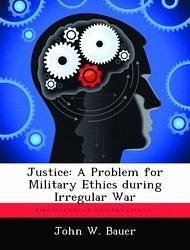Nicht lieferbar

Justice: A Problem for Military Ethics during Irregular War
Versandkostenfrei!
Nicht lieferbar
This monograph directly addresses the problem posed when considering the question 'Who says what right is?'; or 'Justice according to whom?'; The relative nature of the term 'justice' creates a problem for military ethics, particularly when soldiers try to determine what actions are morally acceptable while engaged in irregular war. This problem prompted a distinct way of thinking about 'justice' to form over the course of history, called the Just War Tradition. However, instead of encouraging ethical reflection, Just War Tradition has today caused military ethics to drift toward legalism. Wha...
This monograph directly addresses the problem posed when considering the question 'Who says what right is?'; or 'Justice according to whom?'; The relative nature of the term 'justice' creates a problem for military ethics, particularly when soldiers try to determine what actions are morally acceptable while engaged in irregular war. This problem prompted a distinct way of thinking about 'justice' to form over the course of history, called the Just War Tradition. However, instead of encouraging ethical reflection, Just War Tradition has today caused military ethics to drift toward legalism. What can stop this slide into strict formalism, where law eclipses ethics? The research conducted for this monograph has led the author to believe that the answer lies in a philosophical current called personalism, which has synthesized the Aristotelian and Kantian positions. Simply stated, personalism promotes empathetic reflection prior to acting. Personalism does this by emphasizing the equal dignity of human beings, an idea that is particularly salient to irregular war. During irregular war, military actions are intended to win over the civilian population. The value, therefore, of adopting a personalist ethic is not only moral, but also pragmatic, guiding irregular warfare closer to success.










